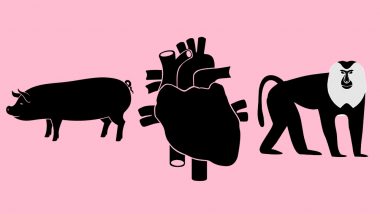A story of a successful heart transplant surgery in Ludwig Maximilian University (LMU) of Munich has offered a ray of hope to patients suffering from terminal cardiac failure. But heart transplant is not a new medical phenomenon; why should it be making news in the first place? This surgery is special since it a first-of-a-kind transplant, where researchers used pig’s hearts on baboons. Four baboons had their hearts replaced with those of genetically-engineered pigs. Stunningly, the primates survived with the transplant for a total of six months, after which they were euthanised. The groundbreaking surgery offers hope for cross-species transplant or xenotransplantation in humans.
The details of the surgery have been published in the journal Nature. According to the paper, a heart transplant is the only option for patients of end-stage cardiac failure. But the long wait for a suitable donor doesn’t end well for most of them. To address this problem, scientists had long suggested xenotransplantation as an option. Gene-Edited Babies Controversy Condemned By The Scientific Community, Chinese Government Orders Probe.
What is Xenotransplantation?
Xenotransplantation is the process of using organs from other species in human beings. The shortage of human donors costs a lot of lives, and one way to plug this paucity is through cross-species transplantation. Pigs (Sus scrofa domestica) are considered the best donors for such transplants since they are anatomically and physiologically similar to humans.
There are many advantages of xenotransplantation for humans. For starters, patients, from adults to infants, need not wait endlessly to find a suitable organ. Breeding pigs is also a cost-effect solution, which can allow breeders to harvest organs according to the needs of the recipient. The organs will be available almost immediately.
Organs from dead donors are damaged to a certain extent due to brain death hormonal changes at the time of death. This drawback can be avoided with xenotransplantation. From Penis Transplant to FDA-Approved Cannabis, 14 Biggest Moments in Health This Year.
Some patients who are not selected by the transplant team because they have lesser chances of survival can also be offered a chance because there won’t be any shortage of organs. 8 Things You Should Know About Donating Your Organs.
Countries like Japan, where there is a cultural barrier against using a dead person’s organs, xenotransplantation will offer some hope.
It can also help address some of the ethical concerns of offering money to live donors in exchange of organs. Millions of pigs are slaughtered every year for food. Pigs are already being used to source heart valves, heparin and tissues in humans.
What Are The Drawbacks of Xenotransplant?
But just because it’s possible doesn’t mean that it’s easy. Molecular incompatibility between the animal donor and the recipient increases the chances of organ rejection in humans. But rapid advancements in the field of genetic engineering has helped us bypass some of the cross-species immune barriers. One way to achieve that is modifying the genome in pigs through the CRISPR –Cas9 gene-editing tool.
Pigs can also pass on certain viruses to humans and the community at large through the transplant. Porcine endogenous retroviruses (PERV) are one of the risk factors. But certain precautions can help reduce the risk such as housing the pigs meant for transplant in clean environments and monitoring their health before harvesting the organs.
The surgery raises hopes of carrying out xenotransplant in humans. In the coming years, it will be exciting to see how cross-species organ transplant can revolutionise medical science.
(The above story first appeared on LatestLY on Dec 18, 2018 07:38 PM IST. For more news and updates on politics, world, sports, entertainment and lifestyle, log on to our website latestly.com).













 Quickly
Quickly




















